1990 VOLKSWAGEN TRANSPORTER check engine
[x] Cancel search: check enginePage 89 of 165
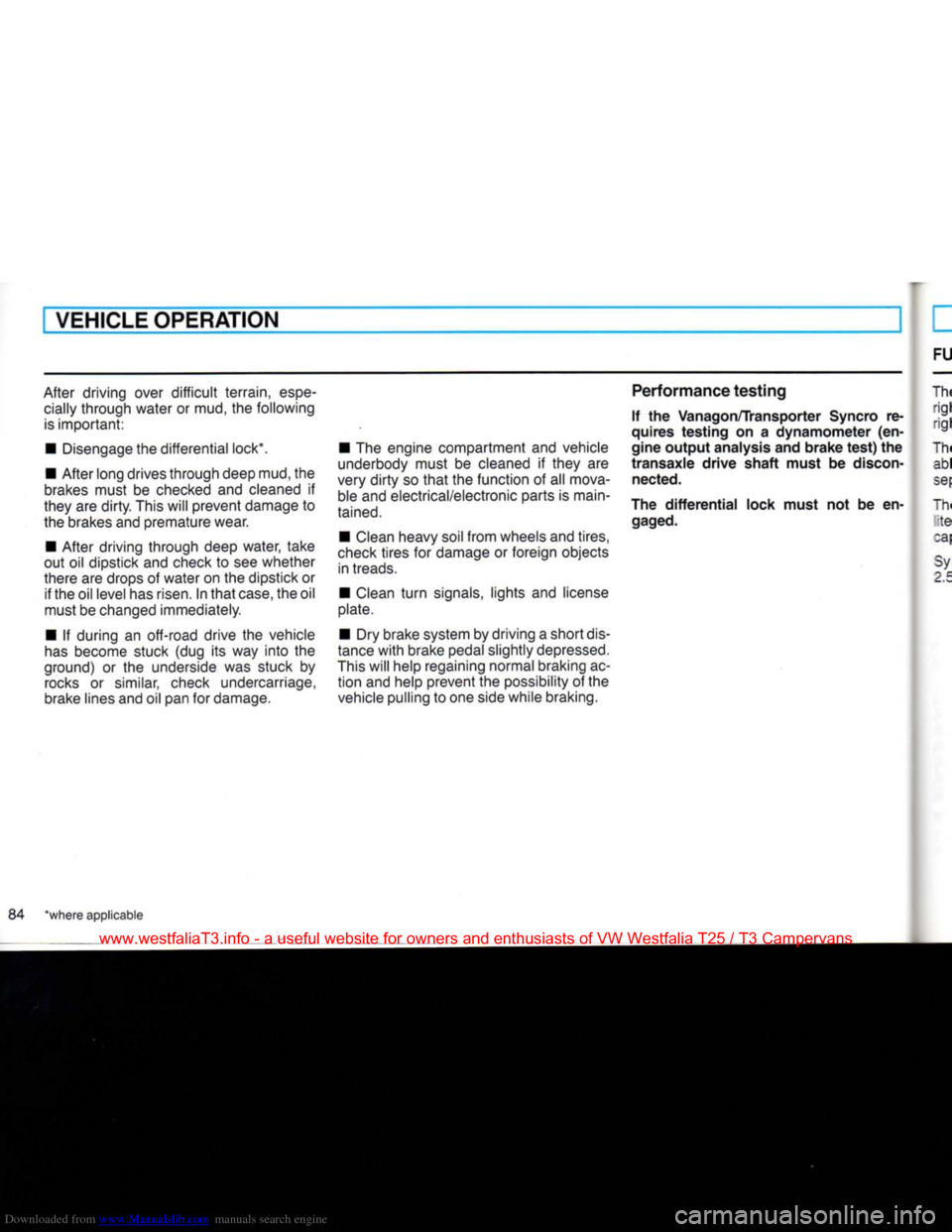
Downloaded from www.Manualslib.com manuals search engine
VEHICLE OPERATION
After driving over
difficult
terrain,
espe
cially through water or mud, the following
is
important:
• Disengage the differential lock*.
• After long drives through deep mud, the
brakes must be checked and cleaned if
they are
dirty.
This will prevent damage to
the brakes and premature wear.
• After driving through deep water, take
out oil dipstick and check to see whether
there are drops of water on the dipstick or if the oil level has risen. In
that
case,
the oil
must be changed immediately.
• If during an off-road drive the vehicle
has
become stuck (dug its way
into
the
ground) or the underside was stuck by
rocks
or similar, check undercarriage,
brake lines and oil pan for damage. • The engine compartment and vehicle
underbody must be cleaned if they are
very
dirty
so
that
the function of all mova ble and electrical/electronic parts is main
tained.
•
Clean
heavy soil from wheels and tires,
check
tires for damage or foreign objects in treads.
•
Clean
turn
signals, lights and license
plate.
• Dry brake system by driving a short dis
tance
with
brake pedal slightly depressed.
This
will help regaining normal braking ac
tion
and help prevent the possibility of the
vehicle pulling to one side while braking.
Performance
testing
If the
Vanagon/Transporter
Syncro re
quires
testing
on a
dynamometer
(en
gine
output
analysis and
brake
test)
the
transaxle
drive
shaft
must
be discon nected.
The
differential
lock
must
not be en gaged.
84 "where applicable
www.westfaliaT3.info - a useful website for owners and enthusiasts of VW Westfalia T25 / T3 Campervans
Page 101 of 165
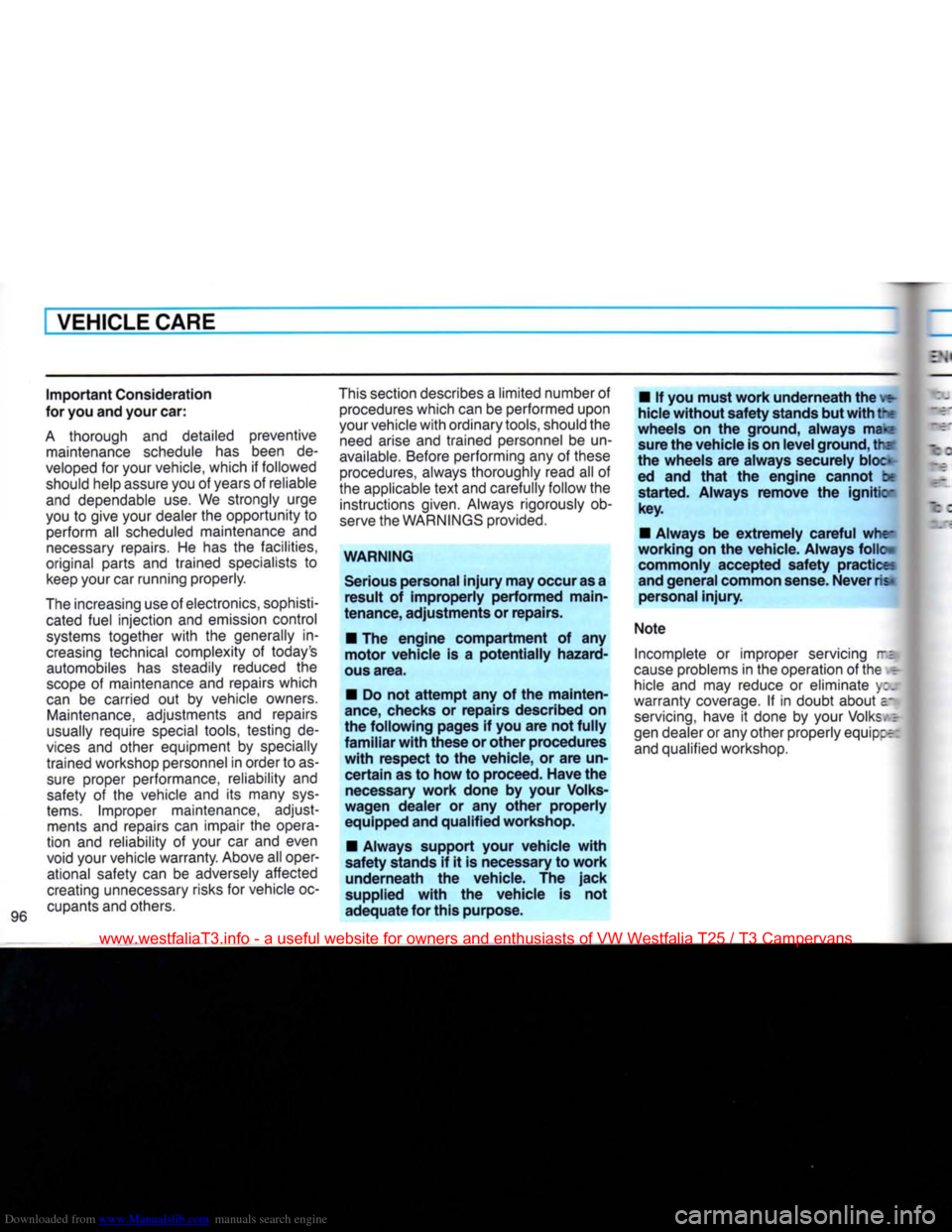
Downloaded from www.Manualslib.com manuals search engine
VEHICLE CARE
Important
Consideration
for you and your car:
A
thorough and detailed preventive maintenance schedule has been de
veloped
for your vehicle, which if followed
should
help assure you of years of reliable
and
dependable use. We strongly urge
you to give your dealer the opportunity to perform all scheduled maintenance and
necessary
repairs. He has the facilities,
original parts and trained specialists to
keep
your car running properly.
The
increasing use of electronics, sophisti
cated
fuel injection and emission control
systems
together
with
the generally in
creasing
technical complexity of today's automobiles has steadily reduced the
scope
of maintenance and repairs which
can
be carried out by vehicle owners.
Maintenance,
adjustments and repairs
usually
require special tools, testing de
vices
and other equipment by specially
trained workshop personnel in order to as
sure
proper performance, reliability and
safety of the vehicle and its many
sys
tems.
Improper maintenance, adjust ments and repairs can impair the opera
tion and reliability of your car and even
void your vehicle warranty. Above all oper ational safety can be adversely affected
creating unnecessary risks for vehicle oc
cupants and others.
This
section describes a limited number of
procedures
which can be performed upon
your vehicle
with
ordinary tools, should the
need
arise and trained personnel be un
available.
Before performing any of these
procedures,
always thoroughly read all of
the applicable
text
and carefully follow the instructions given. Always rigorously ob
serve
the
WARNINGS
provided.
WARNING
Serious personal
injury
may occur as a
result
of
improperly
performed
main
tenance,
adjustments
or
repairs.
• The
engine
compartment
of any
motor
vehicle
is a
potentially
hazard
ous
area.
• Do not
attempt
any of the
mainten
ance, checks or
repairs
described on
the
following
pages if you are not
fully
familiar
with
these
or
other
procedures
with
respect
to the vehicle, or are un
certain
as to how to proceed.
Have
the necessary
work
done
by your Volks
wagen
dealer
or any
other
properly
equipped
and
qualified
workshop.
•
Always support
your
vehicle
with
safety
stands if it is necessary to
work
underneath
the vehicle. The
jack
supplied
with
the
vehicle
is not
adequate
for
this
purpose. • If you
must
work
underneath
the . =-
hide
without
safety
stands but
with
t--t
wheels
on the ground,
always
ma-: sure the
vehicle
is on
level
ground, tr:
the
wheels
are
always
securely bloc ed and
that
the
engine
cannot
•
started.
Always
remove
the
ignitio-
key.
•
Always
be
extremely
careful
whe-
working
on the vehicle.
Always
folic commonly accepted
safety
practice*
and
general
common sense.
Never
ris• personal
injury.
Note
Incomplete or improper servicing ri
cause
problems in the operation of the r-
hicle
and may reduce or eliminate y;.
warranty coverage. If in doubt about a-
servicing,
have it done by your
Volks/
E-
gen
dealer or any other properly equips
and
qualified workshop.
www.westfaliaT3.info - a useful website for owners and enthusiasts of VW Westfalia T25 / T3 Campervans
Page 102 of 165
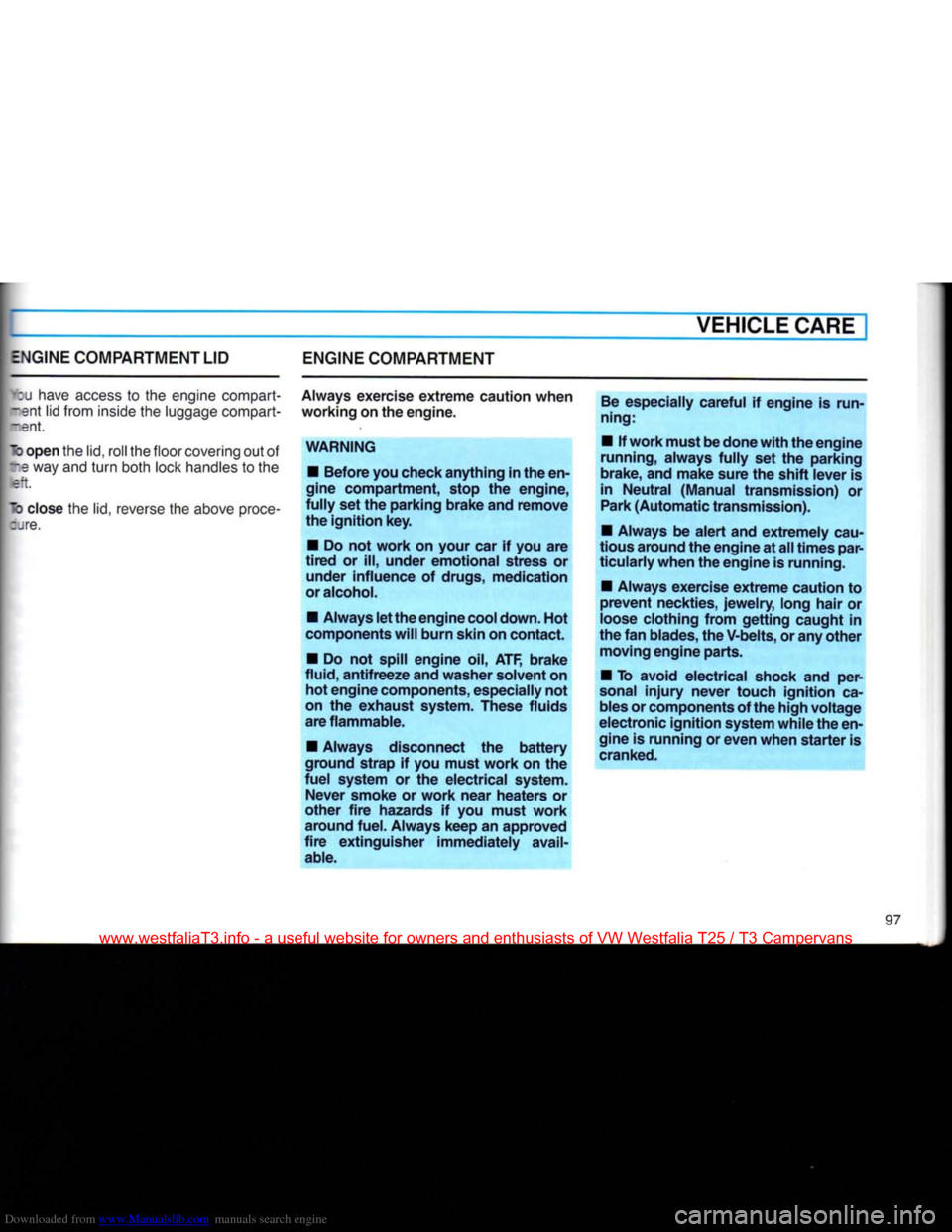
Downloaded from www.Manualslib.com manuals search engine
VEHICLE
CARE
ENGINE
COMPARTMENT LID
mu
have access to the engine compart-
•Mit
lid from inside the luggage compart- -ent.
"lb
open the
lid,
roll the floor covering out of
~9
way and
turn
both lock handles to the
Tb close the lid, reverse the above proce- ;jre.
ENGINE
COMPARTMENT
Always exercise extreme caution when
working on the engine. WARNING
•
Before you check anything in the en
gine compartment, stop the engine,
fully set the parking brake and remove
the ignition key.
•
Do not work on
your
car if you are
tired or ill, under emotional stress or under influence of drugs, medication
or alcohol.
•
Always let the engine cool down. Hot
components will burn skin on contact.
•
Do not spill engine oil, ATF, brake
fluid,
antifreeze and washer solvent on hot engine components, especially not
on the exhaust system.
These
fluids
are
flammable.
•
Always disconnect the battery
ground strap if you must work on the
fuel
system or the electrical system.
Never
smoke or work near heaters or
other fire hazards if you must work
around
fuel.
Always keep an approved
fire extinguisher immediately
avail
able.
Be
especially careful if engine is run
ning:
•
If work must be done with the engine
running, always fully set the parking
brake,
and make sure the shift lever is
in Neutral (Manual transmission) or
Park
(Automatic transmission).
•
Always be alert and extremely
cau
tious around the engine at
all
times par
ticularly when the engine is running.
•
Always exercise extreme caution to
prevent
neckties,
jewelry,
long hair or
loose clothing from getting caught in
the fan blades, the V-belts, or any other
moving
engine parts.
•
To avoid electrical shock and per
sonal
injury
never
touch ignition ca
bles
or components of the high voltage
electronic ignition system while the en
gine is running or even when starter is
cranked.
97
www.westfaliaT3.info - a useful website for owners and enthusiasts of VW Westfalia T25 / T3 Campervans
Page 104 of 165
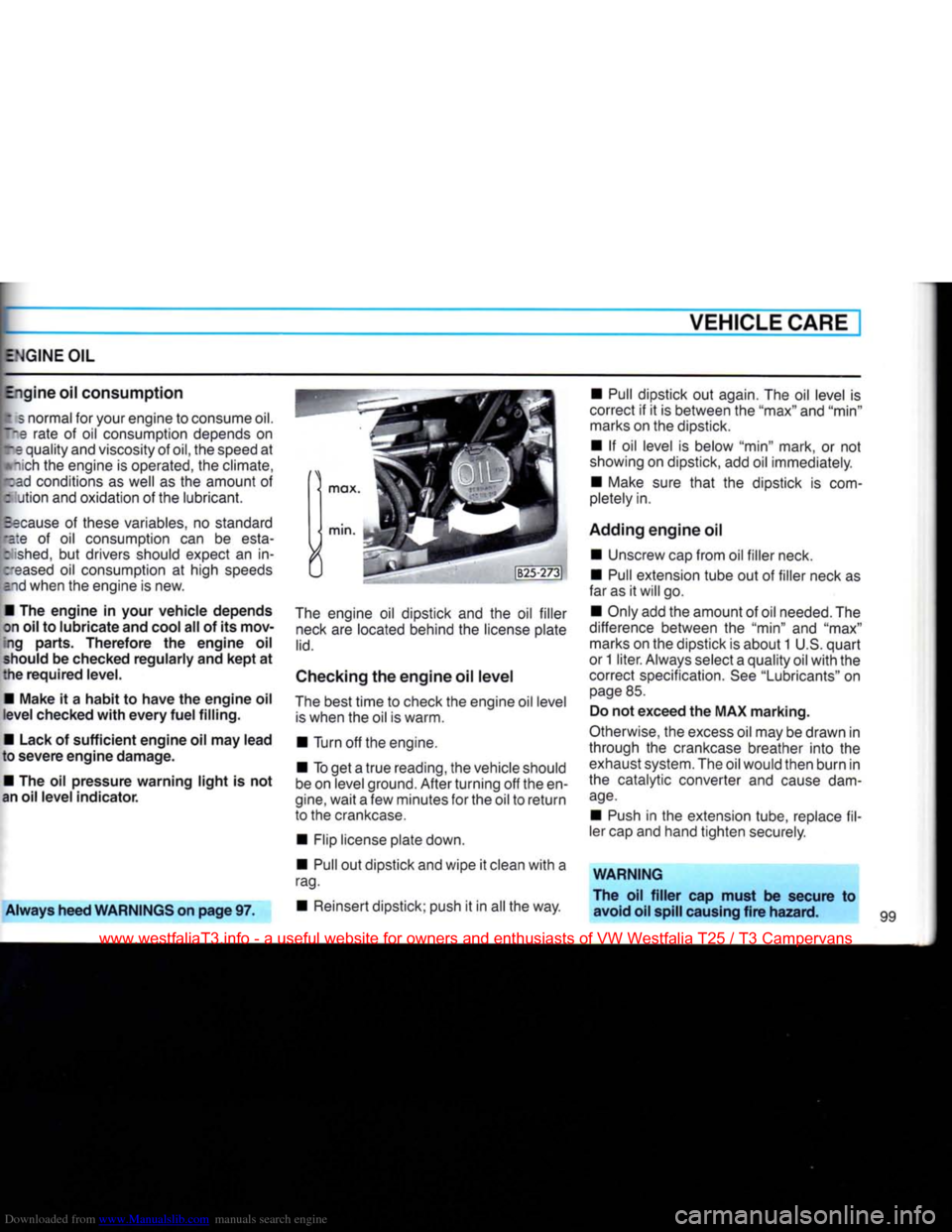
Downloaded from www.Manualslib.com manuals search engine
VEHICLE CARE
ENGINE OIL
Engine oil consumption t 3 normal for your engine to consume oil.
T-Q
rate of oil consumption depends on
re quality and viscosity of
oil,
the speed at
Mich
the engine is operated, the climate,
read
conditions as well as the amount of : ution and oxidation of the lubricant.
Because
of these variables, no standard
•e:e
of oil consumption can be esta-
:
shed,
but drivers should expect an in
creased
oil consumption at high speeds
s.nd when the engine is new.
• The
engine
in your
vehicle
depends
on oil to
lubricate
and cool all of its
mov
ing
parts.
Therefore
the
engine
oil
should be checked
regularly
and
kept
at
the
required
level.
•
Make
it a
habit
to
have
the
engine
oil
level
checked
with
every
fuel
filling.
• Lack of
sufficient
engine
oil may
lead
to
severe
engine
damage.
• The oil pressure
warning
light
is not
an oil
level
indicator.
Always
heed
WARNINGS
on
page
97.
The
engine oil dipstick and the oil filler
neck
are located behind the license plate
lid.
Checking the
engine
oil
level
The
best time to check the engine oil level
is
when the oil is warm.
• Turn off the engine.
• To get a true reading, the vehicle should
be
on level ground. After turning off the en
gine,
wait a few minutes for the oil to return
to the crankcase.
• Flip license plate down.
• Pull out dipstick and wipe it clean
with
a
rag.
• Reinsert dipstick; push it in all the way. • Pull dipstick out again. The oil level is
correct if it is between the "max" and "min" marks on the dipstick.
• If oil level is below "min" mark, or not
showing on dipstick, add oil immediately.
• Make sure
that
the dipstick is com
pletely in.
Adding
engine
oil • Unscrew cap from oil filler neck.
• Pull extension tube out of filler neck as
far as it will go.
• Only add the amount of oil needed. The
difference between the "min" and "max" marks on the dipstick is about
1
U.S. quart
or
1
liter. Always select a quality oil
with
the
correct specification. See "Lubricants" on
page
85.
Do not exceed the MAX
marking.
Otherwise,
the excess oil may be drawn in
through the crankcase breather into the exhaust system. The oil would then burn in
the catalytic converter and cause dam
age.
•
Push
in the extension tube, replace fil
ler cap and hand tighten securely.
WARNING
The oil
filler
cap
must
be secure to avoid oil spill causing
fire
hazard.
www.westfaliaT3.info - a useful website for owners and enthusiasts of VW Westfalia T25 / T3 Campervans
Page 105 of 165
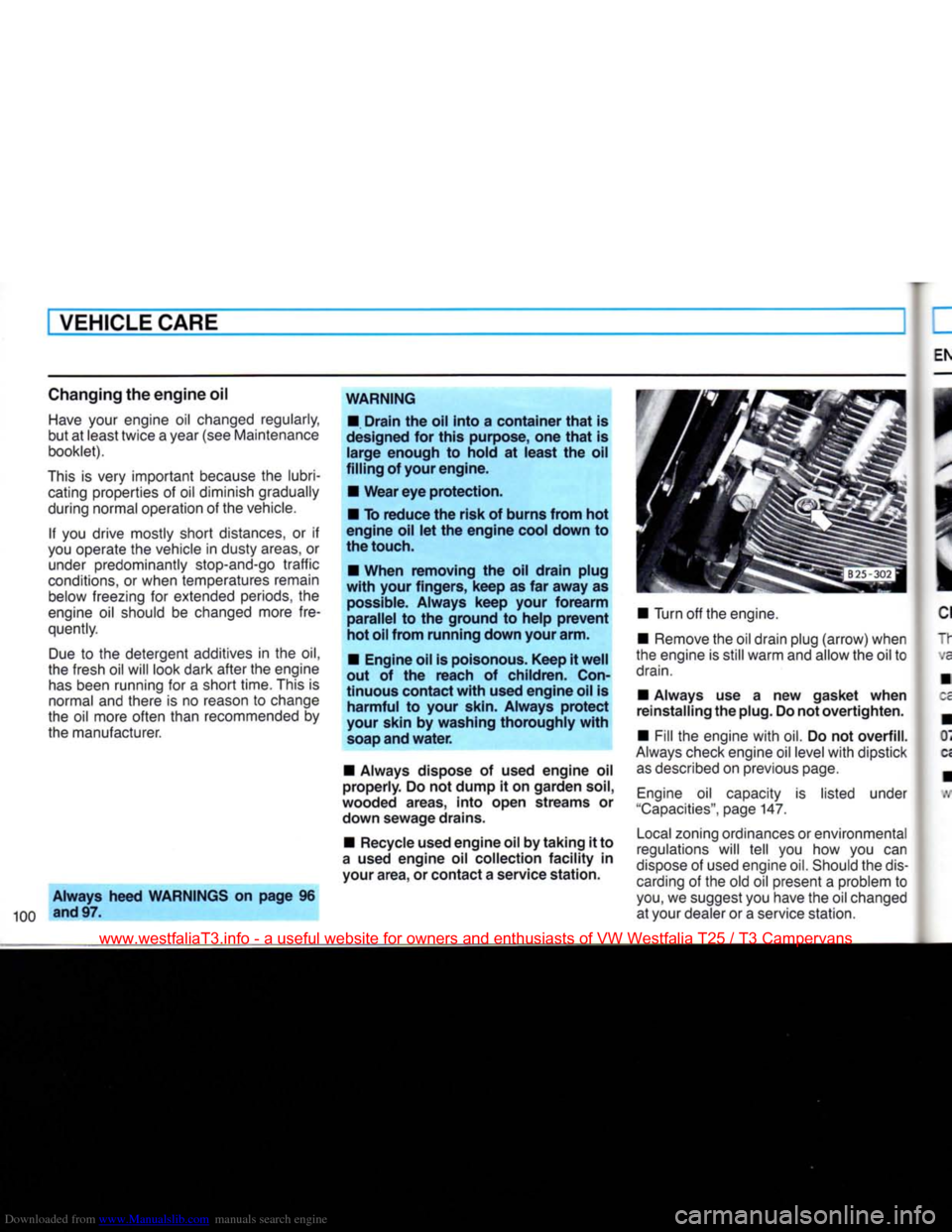
Downloaded from www.Manualslib.com manuals search engine
VEHICLE CARE
Changing the
engine
oil
Have
your engine oil changed regularly,
but at least twice a year (see Maintenance
booklet).
This
is very important because the lubri cating properties of oil diminish gradually
during normal operation of the vehicle.
If you drive mostly short distances, or if
you operate the vehicle in dusty
areas,
or under predominantly stop-and-go traffic
conditions, or when temperatures remain below freezing for extended periods, the
engine oil should be changed more fre
quently.
Due
to the detergent additives in the oil,
the fresh oil will look dark after the engine
has
been running for a short time. This is
normal and there is no reason to change
the oil more often than recommended by
the manufacturer.
Always
heed
WARNINGS
on
page
96
100 and97-
WARNING
•
Drain
the oil
into
a
container
that
is
designed for
this
purpose, one
that
is
large
enough to hold at
least
the oil
filling
of your
engine.
•
Wear
eye
protection.
• To
reduce
the
risk
of burns
from
hot
engine
oil let the
engine
cool
down
to
the touch.
•
When
removing
the oil
drain
plug
with
your fingers,
keep
as far
away
as possible.
Always
keep
your
forearm
parallel
to the ground to
help
prevent
hot oil
from
running
down
your arm.
• Engine oil is poisonous. Keep it
well
out of the
reach
of children. Con
tinuous
contact
with
used
engine
oil is
harmful
to your skin.
Always
protect
your skin by
washing
thoroughly
with
soap and
water.
•
Always
dispose of used
engine
oil
properly.
Do not
dump
it on
garden
soil,
wooded
areas,
into
open
streams
or
down
sewage
drains.
• Recycle used
engine
oil by
taking
it to
a used
engine
oil collection
facility
in
your
area,
or
contact
a service
station.
• Turn off the engine.
• Remove the oil drain plug (arrow) when
the engine is still warm and allow the oil to
drain.
•
Always
use a new
gasket
when
reinstalling
the plug. Do not
overtighten.
•
Fill
the engine
with
oil. Do not
overfill.
Always
check engine oil level
with
dipstick
as
described on previous page.
Engine
oil capacity is listed under
"Capacities",
page 147.
Local
zoning ordinances or environmental
regulations will tell you how you can
dispose
of used engine oil. Should the dis carding of the old oil present a problem to
you,
we suggest you have the oil changed
at your dealer or a service station.
www.westfaliaT3.info - a useful website for owners and enthusiasts of VW Westfalia T25 / T3 Campervans
Page 106 of 165
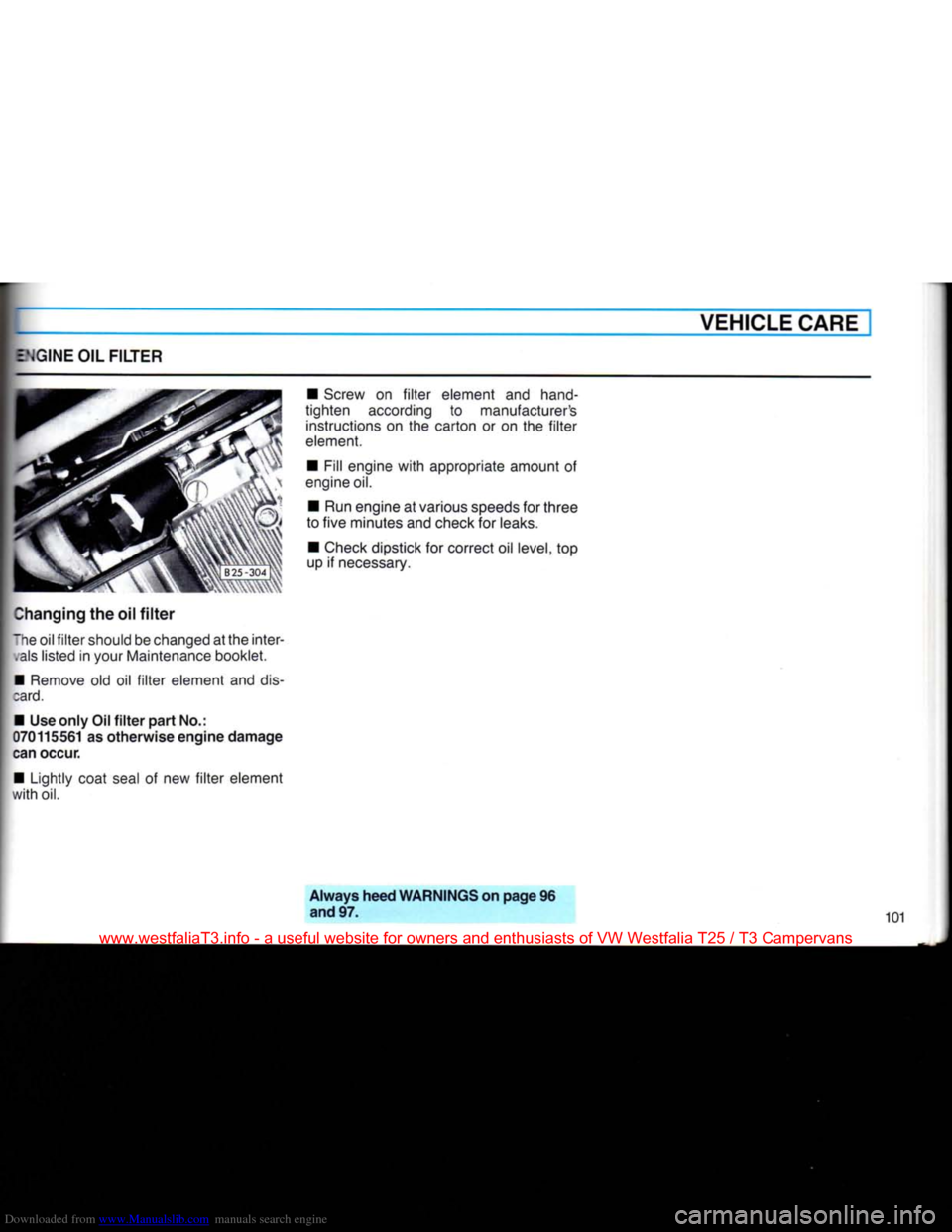
Downloaded from www.Manualslib.com manuals search engine
VEHICLE CARE
ENGINE OIL FILTER
: he oil
filter
should be changed at the inter-
,als
listed in your Maintenance booklet.
• Remove old oil
filter
element and dis
card.
• Use
only
Oil
filter
part
No.:
070115561
as
otherwise
engine
damage
can occur.
• Lightly coat seal of new
filter
element
with
oil. • Screw on
filter
element and hand-
tighten according to manufacturer's instructions on the carton or on the
filter
element.
• Fill engine
with
appropriate amount of
engine oil.
• Run engine at various speeds for three
to five minutes and check for leaks.
• Check dipstick for correct oil level, top
up if necessary.
Always
heed
WARNINGS
on
page
96 and 97. 101
www.westfaliaT3.info - a useful website for owners and enthusiasts of VW Westfalia T25 / T3 Campervans
Page 107 of 165
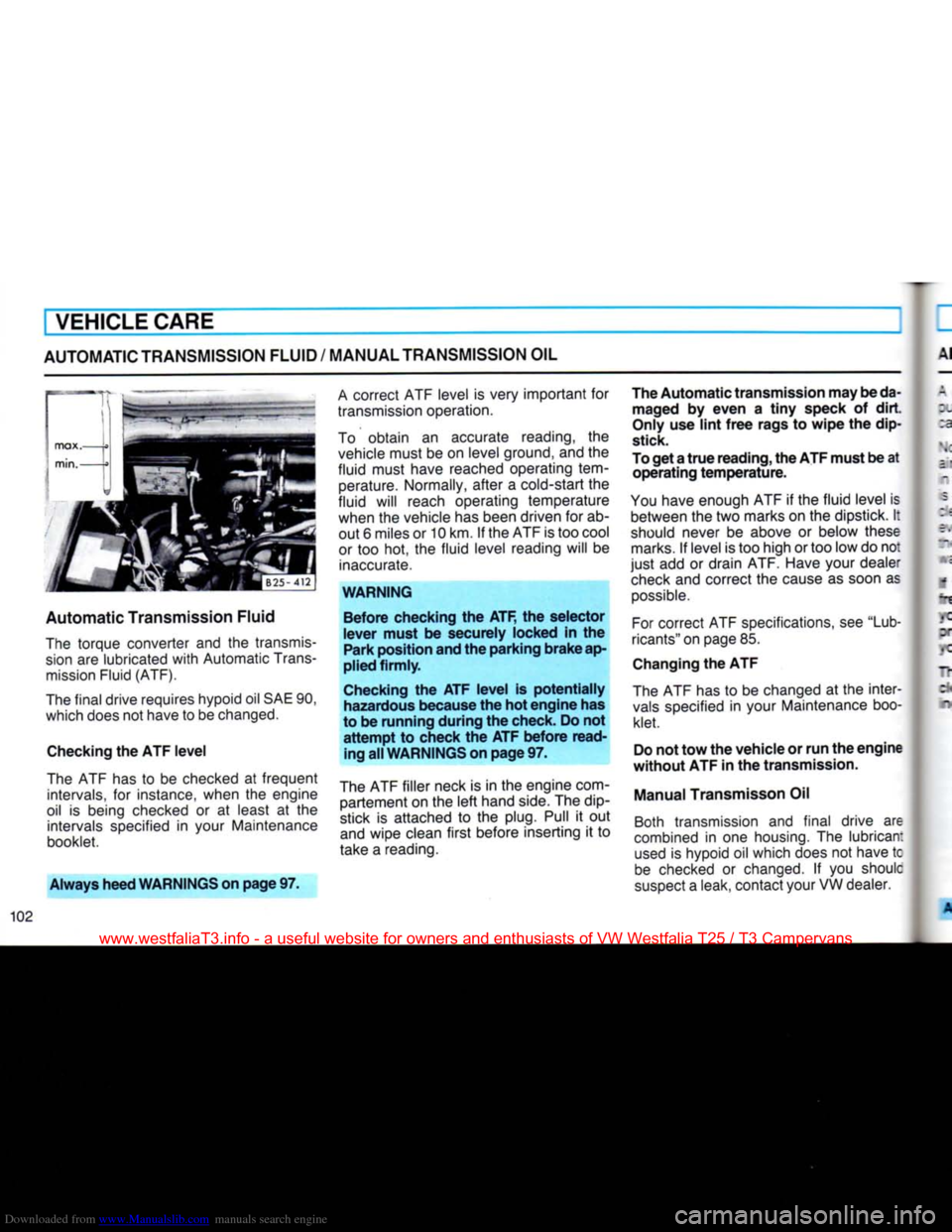
Downloaded from www.Manualslib.com manuals search engine
VEHICLE CARE
AUTOMATIC TRANSMISSION FLUID / MANUAL TRANSMISSION OIL
Automatic Transmission Fluid
The torque converter and the transmis
sion are lubricated with Automatic Trans mission Fluid (ATF).
The final drive requires hypoid oil SAE 90,
which does not have to be changed.
Checking the ATF level
The ATF has to be checked at frequent intervals, for instance, when the engine
oil is being checked or at least at the intervals specified in your Maintenance
booklet.
Always heed WARNINGS on page 97. A correct ATF level is very important for
transmission operation.
To obtain an accurate reading, the
vehicle must be on level ground, and the
fluid must have reached operating
tem
perature. Normally, after a cold-start the
fluid will reach operating temperature when the vehicle has been driven for ab
out 6 miles or 10 km. If the ATF is too cool
or too hot, the fluid level reading will be inaccurate.
WARNING Before checking the ATF, the selector
lever must be securely locked in the Park position and the parking brake ap
plied firmly.
Checking the ATF level is potentially hazardous because the hot engine has
to be running during the check. Do not
attempt to check the ATF before read ing all WARNINGS on page 97.
The ATF filler neck is in the engine com- partement on the left hand side. The dip
stick is attached to the
plug.
Pull it out
and wipe clean first before inserting it to
take a reading. The Automatic transmission may be da
maged by even a tiny speck of dirt.
Only use lint free rags to wipe the dip
stick.
To get a true reading, the ATF must be at operating temperature.
You have enough ATF if the fluid level is between the two marks on the dipstick. I:
should never be above or below these marks. If level is too high or too low do not
just add or drain ATF. Have your dealer check and correct the cause as soon as possible.
For correct ATF specifications, see "Lub
ricants" on page 85.
Changing the ATF
The ATF has to be changed at the inter vals specified in your Maintenance booklet.
Do not tow the vehicle or run the engine
without ATF in the transmission.
Manual Transmisson Oil Both transmission and final drive are
combined in one housing. The lubrican: used is hypoid oil which does not have tc
be checked or changed. If you shoulc
suspect a leak, contact your VW dealer.
www.westfaliaT3.info - a useful website for owners and enthusiasts of VW Westfalia T25 / T3 Campervans
Page 108 of 165
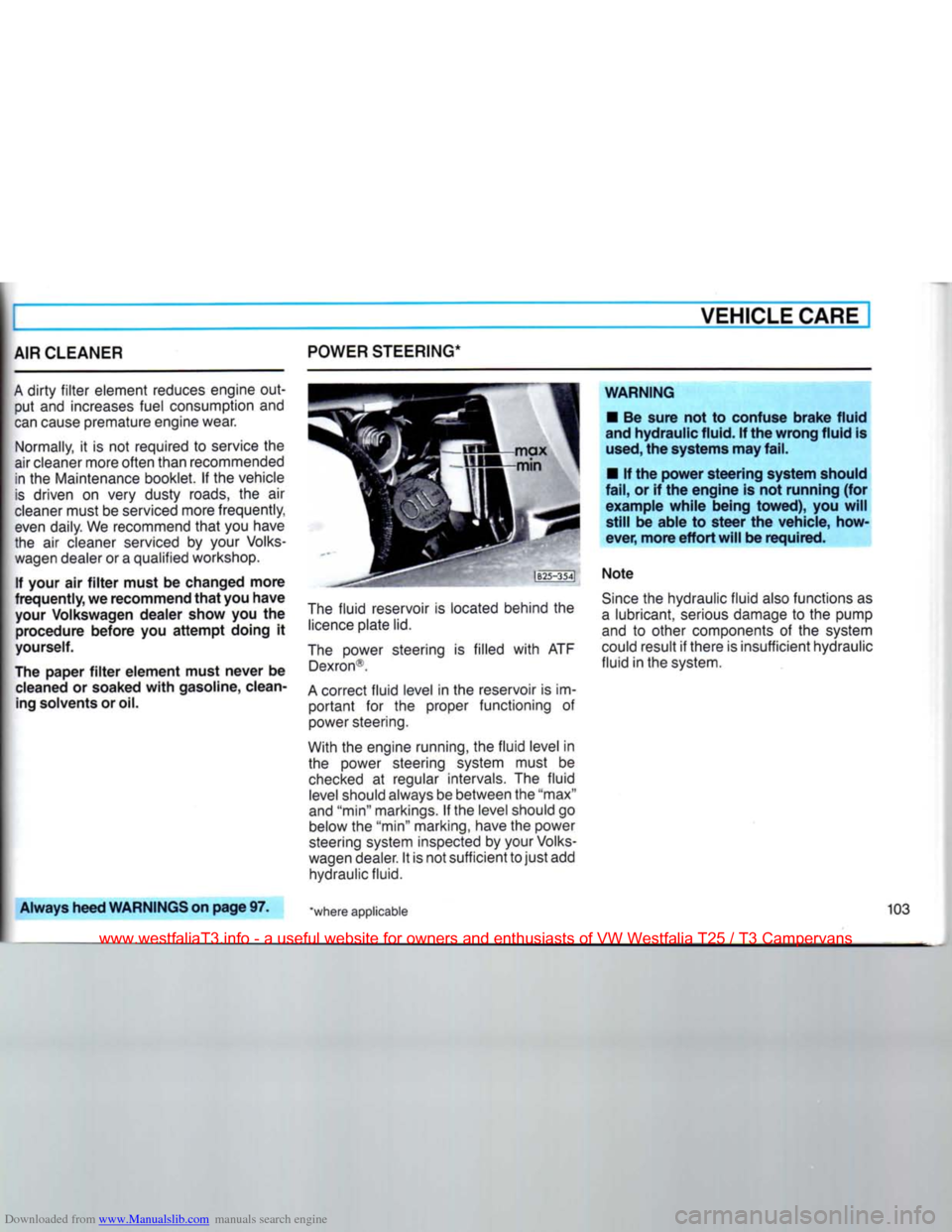
Downloaded from www.Manualslib.com manuals search engine
VEHICLE
CARE
I
AIR CLEANER
A
dirty
filter
element reduces engine
out
put and increases fuel consumption and
can
cause premature engine wear.
Normally, it is not required to service the
air cleaner more often than recommended in the Maintenance booklet. If the vehicle
is
driven on very dusty roads, the air
cleaner
must be serviced more frequently,
even
daily. We recommend
that
you have
the air cleaner serviced by your
Volks
wagen dealer or a qualified workshop.
If
your
air
filter
must
be
changed more
frequently,
we
recommend
that
you have
your
Volkswagen dealer show
you the
procedure
before
you
attempt
doing
it
yourself.
The
paper
filter
element must never
be
cleaned
or
soaked
with
gasoline, clean
ing
solvents or oil. POWER STEERING*
The
fluid
reservoir is located behind the
licence
plate lid.
The
power steering is filled
with
ATF Dexron®.
A
correct
fluid
level in the reservoir is im
portant
for the proper functioning of
power steering.
With the engine running, the
fluid
level in the power steering system must be
checked
at regular intervals. The
fluid
level
should always be between the "max"
and "min" markings. If the level should go below the "min" marking, have the power
steering system inspected by your
Volks
wagen dealer. It is not sufficient to
just
add hydraulic fluid.
WARNING
•
Be
sure
not to
confuse brake fluid
and
hydraulic fluid.
If
the wrong fluid
is
used,
the systems may fail.
•
If the
power steering system should
fail,
or if the
engine
is not
running
(for
example
while
being
towed),
you
will
still
be
able
to
steer
the
vehicle, how
ever, more
effort
will
be required.
Note
Since
the hydraulic
fluid
also functions as
a
lubricant, serious damage to the pump
and to other components of the system
could result if there is insufficient hydraulic
fluid
in the system.
Always
heed WARNINGS on page
97. "where applicable
www.westfaliaT3.info - a useful website for owners and enthusiasts of VW Westfalia T25 / T3 Campervans